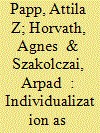| Srl | Item |
| 1 |
ID:
152475


|
|
|
|
|
| Summary/Abstract |
This article offers an introduction to the special issue. It presents the arguments why a political anthropological perspective can be particularly helpful to understand the connected political and cultural challenges and opportunities posed by the situation of ethnic and religious minorities. The article concisely introduces the major anthropological concepts used, including liminality, trickster, imitation, and schismogenesis; concepts that are used together with approaches of historical sociology and genealogy, especially concerning the rise and fall of empires, and their lasting impact. The suggested conceptual framework is particularly helpful for understanding how marginal places can become liminal, appearing suddenly at the center of political attention. The article also shows the manner in which minority existence can problematize the depersonalizing tendencies of modern globalization.
|
|
|
|
|
|
|
|
|
|
|
|
|
|
|
|
| 2 |
ID:
152476


|
|
|
|
|
| Summary/Abstract |
This article argues that the option of dual citizenship, available since 2010 for Hungarians living abroad, carries the possibility to create new types of national and civic identification patterns. This process can be considered as liminal, since it attempts to modify the nature of minority identity that was created by historic traumas and became institutionalized as social order, and because it attempts to open a new chapter in the relationship between Hungary and the Hungarian minority communities abroad. Although the patterns of the new (citizenship-influenced) minority identity are already somewhat visible, the full elaboration of this identity is yet to come. Therefore, the “managers” of the identity change might become tricksters.
|
|
|
|
|
|
|
|
|
|
|
|
|
|
|
|